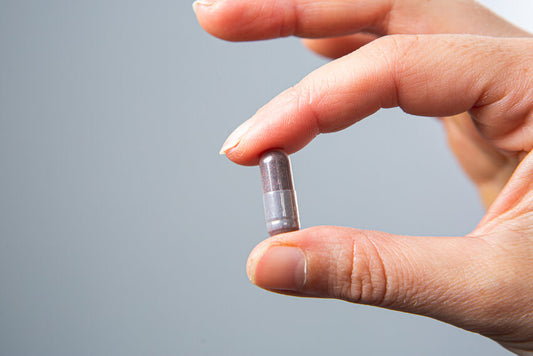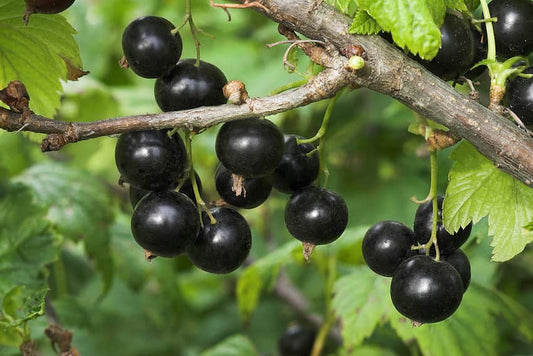When it comes to hopping on the bus with supplements, there’s one that practically everyone can get on board with: antioxidants. Whether you’re an athlete training five days a week or working at a greenhouse exposed to pesticides, antioxidants are crucial to protect your body from harmful free radicals---but they’re also super important to protect your vision.
Backed by a solid body of research, antioxidant benefit overall health and well-being, and are especially essential for the eyes. While there are plenty to go around, there’s one that we want to shine the spotlight on for your eyes---lutein.
Native to many colorful fruits and vegetables and egg yolks (that, funny enough, resemble an eye!), lutein is an ultra-protector of your vision.
So, let’s break down the details on lutein and give you everything we know about lutein for eye health.
We’ll also provide some other fantastic supplements for supporting healthy vision and give you our best pick for the best eye vitamin supplement for 2025.
What Is Lutein?
Lutein is one of the most widely distributed carotenoids found in fruits and vegetables, and its presence in human tissues is derived solely from diet.
The distribution of lutein in the body tissues is similar to most other antioxidants, but it’s mainly concentrated in the retina 1. Lutein and its counterpart, zeaxanthin, are the only two dietary carotenoids in the retina.
They’re highly concentrated in the macula, located at the back of the eye, which is an essential part of vision. Because of where they’re concentrated, these two carotenoids are collectively referred to as macular pigments.
Specifically, lutein is the carotenoid that gives fruits and vegetables their vibrant yellow color. While it’s critical for plant health, it also provides other health benefits to people who consume lutein-rich foods.
More recently, it’s gained a fair bit of publicity for its role in eye health and visual performance, along with reducing the risk of age-related macular degeneration (AMD) 2.
While some research has looked into the role of lutein in cardiovascular disease, cancer, and cataracts, studies have mainly returned inconsistent.
Lutein And Eye Health
Lutein has various bodily roles as a powerful antioxidant, especially in the eyes.
While most of its functions are performed in conjunction with zeaxanthin, which we’ll talk about below, here’s a brief overview of some of its roles:
- Reduce inflammation
- Neutralize free radicals and reduce oxidative stress
- Sharpen vision
- Improve visual contrast sensitivity
- Reduce glare impairment
- Protect eyes against UV damage and blue light
- Reduce cell loss and death related to eye disease
- Support conversion of light signals into electrical signals in the retina
- Assist transmission of signals to the visual cortex in the brain
- Protect against nearsightedness (myopia)
You’ll typically find two antioxidants together- lutein and zeaxanthin and smaller amounts of meso-zeaxanthin.
Zeaxanthin and meso-zeaxanthin are both isomers of lutein and fellow carotenoids that are also imperative for eye health. When it comes to an eye-booster duo, these two are it.
As we mentioned, lutein and its isomers are the only dietary carotenoids in the human retina that make up the macular pigments 3.
The macula is located in the central retina at the back of the eye. It is involved in visual acuity and central vision because of its high concentration of photoreceptor cells 4.
All three of these carotenoids are present in high concentrations in different macula regions---lutein in the periphery, zeaxanthin in the mid-periphery, and meso-zeaxanthin in the center. On top of the macula, lutein is also found in the lens, where it offers protection against age-related eye diseases.
If you want to improve visual acuity and maintain good eye health for life, increasing your dietary intake of carotenoids like lutein can raise serum concentrations and macular pigment density.
Doing so can improve visual function and reduce the risk of age-related ocular diseases 2.
Benefits Of A Lutein Supplement For Healthy Vision
During aging, it’s completely normal to notice minor vision changes.
For most adults, things like impaired vision up close, difficulty distinguishing colors, and needing more time for their eyes to adjust to changing light levels.
While most of these problems have an easy fix---glasses, contacts, corrective lenses, etc.---more severe eye conditions like cataracts and macular degeneration aren’t such an easy fix.
Keeping your eyes healthy through proper lifestyle choices is key to maintaining long-term eye health, but choosing the right eye-supportive foods and vision vitamins can also go a long way to supporting macular health.
Of those food-derived nutrients, lutein has a lot of promise for preventing certain eye conditions, which means increasing your intake of antioxidants like lutein can provide profound benefits.
Here’s what the research shows on lutein and eye diseases:
Age-related macular degeneration (AMD)
Age-related macular degeneration is the leading cause of irreversible blindness in people 50 and over in developed countries 5.
While several factors can contribute to its development, studies consistently show that increasing age and cigarette smoking are significant contributors.
Treatment with antioxidants and zinc may reduce the risk or prevent macular degeneration by about 25% in people with a moderate risk, but study results are mainly mixed.
One study found that oral supplementation with high levels of antioxidants and minerals effectively slowed the progression of advanced stages of AMD 6.
Another study found a decreased risk of neovascular age-related macular degeneration in people who reported the highest intake of dietary lutein and zeaxanthin, while other studies show no association 7.
That said, it’s thought that lutein and zeaxanthin might affect processes involved in modulating light and oxidant exposure because both carotenoids can reflect short-wavelength light 8.
Reduced exposure to specific wavelengths of light might reduce photochemical and oxidant damage to cellular lipids, proteins, and nuclear material, thereby protecting the eye and macular health.
Diabetic retinopathy
Along with AMD, diabetic retinopathy is one of the leading causes of legal blindness among American adults aged 20 to 74 9.
Excessive blood sugar can damage the blood vessels in the retina, leading to permanent alterations and blindness. It develops due to mechanisms such as retinal detachment, preretinal or vitreous hemorrhage, neovascular glaucoma, and macular edema or capillary nonperfusion.
All of this may sound complex, and we’re not going to get into the pathogenesis of DR, but here’s where things get interesting---clinical studies find that antioxidant supplementation, especially lutein and zeaxanthin, may elicit neuroprotective and anti-inflammatory function in the retina.
Studies find that lutein supplementation can improve visual acuity, contrast sensitivity, and macular edema (swelling) in people with diabetic retinopathy, making it a therapeutic agent in treating NDR 10.
The same study also found that lutein and zeaxanthin effectively decreased vascular permeability, inhibited vascular leakage, and protected the integrity of blood vessels.
They can also limit free radical damage by inhibiting them from combining with retinal collagen, thereby strengthening the structure of retinal collagen.
Cataracts
Cataracts develop due to oxidation of the lens. It's another common condition leading to blindness or vision impairment.
Antioxidants, especially lutein, show promise for treating cataracts by preventing the proliferation and migration of lens cells and ultraviolet rays (UV) damage.
A handful of observational studies have found links between high plasma concentrations of lutein and a reduced risk of cataracts 11.
Absorbs blue light
We’re all exposed to blue light in some form.
Blue light is everywhere, whether it’s emitted from a laptop as we write this article, a TV while we dose off watching our favorite show, or LED and fluorescent lighting in nearly every indoor space.
Oh, and not to mention the smartphones we’re attached to at the hip.
While there’s a fair bit of bad press linked to blue light exposure, it’s not all bad---but it has to be consumed at the right time. Excessive blue light exposure can be harmful, especially for the eyes.
Digital devices with screens emit light at a high-energy wavelength of 450-295nm. Because of this high energy, it can trigger free radical formation and subsequent oxidative stress in the eyes, thereby increasing the risk of various ocular conditions.
However, increasing your intake of antioxidants like lutein and zeaxanthin can help protect against the harmful effects of blue light. That’s because both compounds have high absorptivity in the inner retina and form a highly efficient filter for blue light that reaches the back of the eye 8.
These carotenoids absorb the light rays before they can reach the delicate structures of the eye, including the photoreceptors, retinal pigment epithelium, and underlying choriocapillaris.
It’s said that these compounds can reduce blue light intensity by as much as 90%, which significantly impacts oxidative stress on the retina and also may substantially reduce the risk of age-related macular degeneration in people with high serum concentrations of both lutein and zeaxanthin.
Neutralizes free radicals
One of the most notable functions of lutein is as an antioxidant.
When the production of free radicals exceeds the capacity of the body to neutralize and eliminate them, cells become subject to oxidative stress.
Oxidative stress levels increase the risk of a slew of eye health conditions, including cataracts, uveitis, and retinal degeneration 12.
The two hydroxyl groups in lutein cause it to be more polar and hydrophilic than other carotenoids, which means it has a stronger tendency to react with oxygen, act as an antioxidant, and effectively scavenge free radicals 4.
Because lutein can react with these radicals before they can react with cells, it protects against potential damage to cellular structures in the eye.
Where To Find Lutein
While lutein is widely available in supplement form, it’s easy to consume a rich diet, as it’s found in both plant and animal foods.
Egg yolks are by far the richest source of lutein on a per weight basis---maybe that’s why they resemble eyes---but that’s not the only place you can find them 11:
- Dandelion
- Pepper
- Chicory
- Radicchio
- Green leafy vegetables (kale, swiss chard, collard greens, watercress, spinach, mustard greens, turnip greens, arugula)
- Basil
- Parsley
- Paprika
Remember that, like most other carotenoids and fat-soluble vitamins, lutein bioavailability increases when consumed with fat, so if you want to maximize absorption from dietary sources, combine your veggies with a healthy fat source or ensure your supplements are emulsified in fat 13.
More Eye Health Supplements For Vision Health
Want better eye health? Try these eye health supplements!
Zeaxanthin
Zeaxanthin is the other carotenoid often lumped with lutein when referring to eye health.
Like lutein, it possesses powerful antioxidant properties and has been linked to various health benefits, including reducing the risk of age-related macular degeneration, glaucoma, and cataracts 14, 15.
Much of the functions of zeaxanthin are similar to that of lutein, with studies showing that their antioxidant property protects photoreceptor cells in the retina from the free radicals generated in these cells by exposure to light 8.
On top of that, zeaxanthin also filters out high-energy wavelengths of blue light to reduce oxidative stress on the retina and improve macular health.
Bilberry extract
They may look like a North American blueberry, but they’re not quite the same.
Like most other berries, bilberries are a rich source of antioxidants that protect the body against cellular damage from free-radical generating activities.
While bilberries contain a higher concentration of vitamin C and phenolic compounds, they’re an especially rich source of anthocyanins, a powerful flavonoid that gives fruits and vegetables red, purple, and blue color 16.
There isn’t an abundance of research on bilberry extract and eye health. Still, evidence shows that anthocyanins neutralize free radicals by donating hydrogen ions and modulating cell signaling pathways, thereby reducing radical damage 17.
Anthocyanins also facilitate rhodopsin regeneration or interact directly with the rhodopsin molecule, but the exact mechanism still isn’t clear. Rhodopsin, the most abundant protein in the retina rods, functions as the primary photoreceptor molecule of vision.
Bilberry also supports more flexible eye capillaries and improves blood flow to the retina to enhance overall eye health and peak visual performance.
Blackcurrant extract
Like bilberries, blackcurrants are a rich source of anthocyanin antioxidants that support eye health by mitigating free radical damage and increasing blood flow through the optic nerve and micro-vessels.
One study found that supplementation with anthocyanoside concentrate led to greater vasodilation of ocular blood vessels, increased blood flow to the eyes, and reduced visual fatigue 18.
The high concentrations of anthocyanins present in blackcurrants may also support the regeneration of rhodopsin and improve dark adaptations19.
Astaxanthin
Astaxanthin is a powerful antioxidant that’s found in marine algae.
It possesses antioxidant capabilities up to ten times more powerful than zeaxanthin, lutein, and beta-carotene and up to 100 times more powerful than vitamin E 20.
It’s been shown to enhance blood flow to the retina, which increases the delivery of oxygen and nutrients, eases eye fatigue and promotes active visual performance.
Clinical trials suggest that astaxanthin significantly improves the outcomes of several ocular diseases, including diabetic retinopathy, age-related macular degeneration, glaucoma, and cataracts 21.
Saffron
While you may know saffron as one of the most expensive spices in the world, it just so happens to be money for your eyes.
It has concentrated amounts of several antioxidant pigments called safranal and crocin, which protect the macula against free radical damage, nourish macular pigments, and improve blood flow to the eyes.
One study found that daily supplementation with 30mg of saffron for six months significantly improved retinal function in patients with age-related macular disease 22.
The Best Supplement For Eye Health With Lutein: Performance Lab® Vision
Don't bat your eyes at just anything when finding the best product for healthy eyes. You want full-spectrum coverage for maximum benefit---and that’s precisely what Performance Lab Vision offers.

Upgrade your vision and long-range eye health with the most advanced formula for healthy eyes.Stacking nature’s most potent natural eye vitamins in the most advanced forms, Vision strengthens focus speed, motion detection, night vision, and more for optimal eye health.Featuring lutein and zeaxanthin plus purified extracts of bilberry, blackcurrant, and saffron, Vision supports both dynamic eyesight and long-range eye health using only natural ingredients for maximum eye health benefits.One capsule a day is all you need for vision support and to keep the eye doctor away---it's the best eye health supplement on the market.
References
- Granado F, Olmedilla B, Blanco I. Nutritional and clinical relevance of lutein in human health. Br J Nutr. 2003;90(3):487-502.
- Johnson EJ. Role of lutein and zeaxanthin in visual and cognitive function throughout the lifespan. Nutr Rev. 2014;72(9):605-612.
- Bone RA, Landrum JT, Tarsis SL. Preliminary identification of the human macular pigment. Vision Res. 1985;25(11):1531-1535.
- Li LH, Lee JC, Leung HH, Lam WC, Fu Z, Lo ACY. Lutein Supplementation for Eye Diseases. Nutrients. 2020;12(6):1721.
- Coleman HR, Chan CC, Ferris FL 3rd, Chew EY. Age-related macular degeneration. Lancet. 2008;372(9652):1835-1845.
- Age-Related Eye Disease Study Research Group. A randomized, placebo-controlled, clinical trial of high-dose supplementation with vitamins C and E, beta carotene, and zinc for age-related macular degeneration and vision loss: AREDS report no. 8 . Arch Ophthalmol. 2001;119(10):1417-1436. doi:10.1001/archopht.119.10.1417
- Landrum JT, Bone RA. Lutein, zeaxanthin, and the macular pigment. Arch Biochem Biophys. 2001;385(1):28-40.
- Krinsky NI, Landrum JT, Bone RA. Biologic mechanisms of the protective role of lutein and zeaxanthin in the eye. Annu Rev Nutr. 2003;23:171-201.
- Zhang X, Saaddine JB, Chou CF, et al. Prevalence of diabetic retinopathy in the United States, 2005-2008. JAMA. 2010;304(6):649-656.
- Hu BJ, Hu YN, Lin S, Ma WJ, Li XR. Application of Lutein and Zeaxanthin in nonproliferative diabetic retinopathy. Int J Ophthalmol. 2011;4(3):303-306.
- Buscemi S, Corleo D, Di Pace F, Petroni ML, Satriano A, Marchesini G. The Effect of Lutein on Eye and Extra-Eye Health. Nutrients. 2018;10(9):1321.
- Kisic B, Miric D, Zoric L. Free Radical Biology of Eye Diseases. In: Laher I. (eds) Systems Biology of Free Radicals and Antioxidants. Springer, Berlin, Heidelberg. 2014.
- Unlu NZ, Bohn T, Clinton SK, Schwartz SJ. Carotenoid absorption from salad and salsa by humans is enhanced by the addition of avocado or avocado oil. J Nutr. 2005;135(3):431-436.
- Mares J. Lutein and Zeaxanthin Isomers in Eye Health and Disease. Annu Rev Nutr. 2016;36:571-602.
- Demmig-Adams B, López-Pozo M, Stewart JJ, Adams WW 3rd. Zeaxanthin and Lutein: Photoprotectors, Anti-Inflammatories, and Brain Food. Molecules. 2020;25(16):3607. P
- Elisabetta B, Flavia G, Paolo F, et al. Nutritional profile and productivity of bilberry (Vaccinium myrtillus L.) in different habitats of a protected area of the eastern Italian Alps. J Food Sci. 2013;78(5):C673-C678.
- Wang Y, Zhao L, Lu F, et al. Retinoprotective Effects of Bilberry Anthocyanins via Antioxidant, Anti-Inflammatory, and Anti-Apoptotic Mechanisms in a Visible Light-Induced Retinal Degeneration Model in Pigmented Rabbits. Molecules. 2015;20(12):22395-22410.
- Nakaishi H, Matsumoto H, Tominaga S, Hirayama M. Effects of black current anthocyanoside intake on dark adaptation and VDT work-induced transient refractive alteration in healthy humans . Altern Med Rev. 2000;5(6):553-562.
- Matsumoto H, Nakamura Y, Tachibanaki S, Kawamura S, Hirayama M. Stimulatory effect of cyanidin 3-glycosides on the regeneration of rhodopsin. J Agric Food Chem. 2003;51(12):3560-3563.
- Yiki M. Biological functions and activities of animal carotenoids. Pure&App Chem. 1991;63(1):141-146.
- Giannaccare G, Pellegrini M, Senni C, Bernabei F, Scorcia V, Cicero AFG. Clinical Applications of Astaxanthin in the Treatment of Ocular Diseases: Emerging Insights. Mar Drugs. 2020;18(5):239.
- Lashay A, Sadough G, Ashrafi E, Lashay M, Movassat M, Akhondzadeh S. Short-term Outcomes of Saffron Supplementation in Patients with Age-related Macular Degeneration: A Double-blind, Placebo-controlled, Randomized Trial. Med Hypothesis Discov Innov Ophthalmol. 2016;5(1):32-38.















